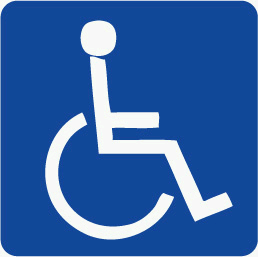
June 9th, 2011 by Dr. Val Jones in News, Opinion
Tags: 1 Billion, Disability, Funding Shortages, medicaid, Medicare, Physical Medicine And Rehabilitation, Rehab Hospitals, WHO, World Bank, World Report On Disability
No Comments »
 The World Health Organization (WHO) and the World Bank just revealed the first-ever global estimate of disability. The report suggests that at least 1 billion people are currently disabled, and about 1/5 of those are experiencing significant difficulties with their activities of daily living. Since people with disabilities experience poorer health, lower educational achievements, fewer economic opportunities and higher rates of poverty than people without disabilities, this vulnerable segment of the population needs much closer attention.
The World Health Organization (WHO) and the World Bank just revealed the first-ever global estimate of disability. The report suggests that at least 1 billion people are currently disabled, and about 1/5 of those are experiencing significant difficulties with their activities of daily living. Since people with disabilities experience poorer health, lower educational achievements, fewer economic opportunities and higher rates of poverty than people without disabilities, this vulnerable segment of the population needs much closer attention.
I’m a physical medicine and rehabilitation (PM&R) specialist by training, and there are only about 8000 of us in the United States. Some have called PM&R specialists: “primary care physicians for the disabled” and I think that’s a reasonable description. The task before us is daunting – with hundreds of millions of people who are not living their lives at maximum functional capacity, rehab physicians should be in great demand.
My experience is that while the demand is great, funding is limited. I’ve seen tragic cases of children being denied critical wheelchair parts, and Read more »
June 9th, 2011 by Toni Brayer, M.D. in Opinion
Tags: Doctors, Patient Preference, Physicians, Should Doctors Wear White Coats, Symbol, White Coats
3 Comments »

 The Doctor’s white coat has been a symbol of the profession for decades. In the 1800’s and up through the early 20th Century, doctors wore street clothes while performing surgery…rolling up their sleeves and plunging dirty hands into patient’s bodies. They often were dressed in formal black, like the clergy to reflect the solemn nature of their role. (And seeing a doctor was solemn indeed as it often led to death)
The Doctor’s white coat has been a symbol of the profession for decades. In the 1800’s and up through the early 20th Century, doctors wore street clothes while performing surgery…rolling up their sleeves and plunging dirty hands into patient’s bodies. They often were dressed in formal black, like the clergy to reflect the solemn nature of their role. (And seeing a doctor was solemn indeed as it often led to death)
A 1889 photograph from the Mass General Hospital shows surgeons in short sleeved white coats over their street clothes and in the early 20th Century the concept of cleanliness and antisepsis was starting to take hold in American medicine. Both doctors and nurses started donning white garb as a symbol of purity. The white coat took on more and more symbolic meaning and the “White Coat Ceremony”, where medical students are allowed to don the formal long white coat, has even been a right of passage with graduation from Medical School.
For the past few years, the American Medical Association and other medical societies have debated if it is time for the white coat to be retired. Read more »
*This blog post was originally published at EverythingHealth*
June 9th, 2011 by AnneHansonMD in Opinion
Tags: Case Studies, HIPAA, Journalism, Journals, Patient Privacy, Social Media, Writing
No Comments »





I can’t find it now, but on one of our posts somewhere MovieDoc has stated that doctors can never ethically write about their patients since they are incapable of giving truly informed consent. Besides the obvious “huh?’ response I have to the idea that patients aren’t capable of making decisions like this, I question the basic assumption that this should never happen.
The medical literature is replete with published anonymized case studies of patients with various maladies. For psychiatry in particular, early psychiatric classification was based on longitudinal descriptions of diseases. If it weren’t for the early case descriptions of Kaposi’s sarcoma in gay men published in the 1980’s, AIDS would not have been identified as a new disease. Case studies can and should be published to advance medical science. Read more »
*This blog post was originally published at Shrink Rap*
June 9th, 2011 by Bryan Vartabedian, M.D. in Opinion
Tags: media, Medical Meetings, Privacy, secrets, Social Media, Twitter
No Comments »

 This NCI Cancer Bulletin article on the use of social media at this week’s American Society of Clinical Oncology is worth reading. It showcases how a major medical organization sees social media unfolding at a national meeting. I’ll be following #ASCO11 closely where some sources predict the Tweet count could reach 10-15,000.
This NCI Cancer Bulletin article on the use of social media at this week’s American Society of Clinical Oncology is worth reading. It showcases how a major medical organization sees social media unfolding at a national meeting. I’ll be following #ASCO11 closely where some sources predict the Tweet count could reach 10-15,000.
What caught my eye was discussion surrounding the speaker-imposed restriction of Twitter at scientific presentations. Apparently some meetings such as the Biology of Genomes Conference at Cold Spring Harbor Laboratory, presenters have to grant permission to allow the use of Twitter (this apparently will not be the case at ASCO).
This is a quote from the meeting media policy at Cold Spring Harbor Laboratory
Often, during the course of a meeting, a scientist will present a discovery, method, or current project that is not yet complete or published. Therefore, to prevent the premature release of confidential information, we require all media attendees to obtain permission in advance from the relevant scientist prior to reporting any spoken or printed information gleaned from the meetings. Media attendees are encouraged to approach scientists out-of-session (e.g. during coffee breaks, poster sessions, wine and cheese parties, etc.) for informal discussions, formal interviews, and/or permission to report sensitive information at the appropriate time. Read more »
*This blog post was originally published at 33 Charts*
June 6th, 2011 by Peggy Polaneczky, M.D. in Opinion, Quackery Exposed
Tags: Bad Medicine, Good Riddance, Marketing, Oprah, Poor Health Information, Pseudoscience, Quackery, Woo
No Comments »

 I wrote once that not only is Oprah Winfrey not a doctor, she plays a really bad one on TV. From promoting Jenny McCarthy and the anti-vaccine movement, to allowing Suzanne Somers a bully-pulpit for her medical woo, to pushing Prudence Hall and her high-dose hormone treatments without acknowledging their potential risks, to leading the church of the Secret as a way to avoid facing the harsh realities of cancer, Oprah did more harm than good when it comes to health.
I wrote once that not only is Oprah Winfrey not a doctor, she plays a really bad one on TV. From promoting Jenny McCarthy and the anti-vaccine movement, to allowing Suzanne Somers a bully-pulpit for her medical woo, to pushing Prudence Hall and her high-dose hormone treatments without acknowledging their potential risks, to leading the church of the Secret as a way to avoid facing the harsh realities of cancer, Oprah did more harm than good when it comes to health.
And while the publishing industry may be hanging crepe, the medical community is breathing a sigh of relief that Oprah has left the airwaves, at least for now. After all, we “conventional” docs were repeatedly relegated to a seat in the audience by Oprah, who usually presented us as naysayers and officials in the Church of Medicine to Oprah’s self-appointed Galileos of Woo, rather than the health experts we are. Of course, it was all couched in terms of female empowerment, a tactic that Oprah long ago taught marketers can be used to sell anything and everything to women.
My axe to grind against Oprah is not just professional, it’s personal. For I saw my sister, nearing the end of her life, turn to the Secret, believing that if she just believed enough in herself, she would be cured. Rather than strengthen her, Read more »
*This blog post was originally published at The Blog That Ate Manhattan*
 The World Health Organization (WHO) and the World Bank just revealed the first-ever global estimate of disability. The report suggests that at least 1 billion people are currently disabled, and about 1/5 of those are experiencing significant difficulties with their activities of daily living. Since people with disabilities experience poorer health, lower educational achievements, fewer economic opportunities and higher rates of poverty than people without disabilities, this vulnerable segment of the population needs much closer attention.
The World Health Organization (WHO) and the World Bank just revealed the first-ever global estimate of disability. The report suggests that at least 1 billion people are currently disabled, and about 1/5 of those are experiencing significant difficulties with their activities of daily living. Since people with disabilities experience poorer health, lower educational achievements, fewer economic opportunities and higher rates of poverty than people without disabilities, this vulnerable segment of the population needs much closer attention.



















